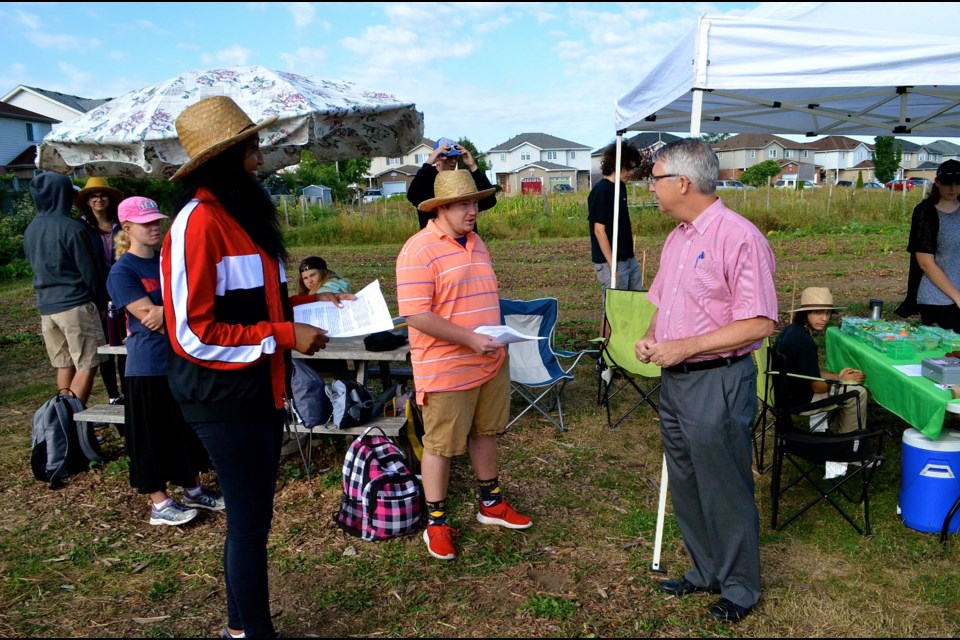A summer job where you can earn money, get volunteer hours and even earn school credits is attractive enough for high school students in the Youth Farm Co-op program but they are also contributing to the growing circular food economy movement.
“We have 123 community gardens in Guelph that are registered with the City of Guelph,” said Guelph MP Lloyd Longfield. “Guelph is one of the Smart Cities in Canada focused on the circular food economy. What you are doing is a great snapshot of what we are trying to do as a community. You are making money at it which is important because farms need to be sustainable.”
Longfield spoke to the students during an Urban Farm Tour last week in Castlebury Park where high school students from across the city are growing vegetables that they sell at their own market every Thursday between 6 p.m. and 8 p.m. at Mitchell Woods Public School.
“It started in 2014 after we surveyed and talked to youth in the neighbourhood about what they do in the summer,” said Linda Busuttil, neighbourhood development coordinator for the West Willow Village Neighbourhood Group. “They didn’t have a lot of choices of what they wanted to do but they wanted to get jobs. This is a model where kids can get a high school credit and they can get some job skills in an incubated environment.”
The students have member-owner shares in the co-op, which allows them to make an income from the products they grow and sell.
“Part of this is so that they understand the value of working together and why it is important to show up and do their share,” said Busuttil. “They have business meetings and we want them to experientially feel what it is like to be the employer when you have deadlines and things to do.”
Ellise Proctor is an environmental science student at the University of Guelph and one of three facilitators hired to guide the students in the co-op.
“Agriculture is really big thing in my program and that is what I am interested in so when Linda interviewed me and told me about the success the program has had growing their own produce and selling it at the market I was really excited,” said Proctor. “It is very different from my other co-op jobs and I love working with the kids.”
The students grow a variety of vegetables and are encouraged to explore the most environmentally and economically sustainable ways to grow and market their crops. They learn through trial and error or, in some cases, the good, the bad and the ugly.
“Our potatoes have been a bit too ugly to sell successfully this year and we have had trouble with pests attracted to them,” said student farmer Logan Borthwick. “This gives us something to look forward to going into next summer.”
Teaching the students about business is the role of facilitator Chloe Neudorf who is studying environmental science, economics and policy in university.
“A lot of what I am learning in school comes into this program and it is really exciting to give back to the community as well,” said Neudorf. “Watching these kids grow up in just a month is pretty awesome.”
She said adapting to market forces and consumer demand requires creative approaches even when it comes to ugly potatoes.
“We use the potatoes when we make our group meals at Mitchell Woods’ kitchen,” said Neudorf. “We make potato salad and stuff like that but some of them do look really, really ugly.”
Jasmine Macleod is the market facilitator and among other things helps to secure products from third parties that the students sell at their market such as fruit from orchards in Niagara, ice cream and honey from Three Sisters Honey.
“My goal is to become a teacher so this is a perfect job for me working with these kids and it is especially nice to see them grow and help give them the skills they are going to need in the future,” said Macleod. “We have all grown special bonds with the students here and it is really nice to come and see them every day and make a good summer with them.”
One goal is to ensure little or no food is wasted even if it doesn’t get sold.
“The kids take produce home and we take anything we can use for the Neighbourhood Group because we have two food rooms as well for fresh produce,” said Busuttil. “We also give food to the Food Bank. We took a huge load of lettuce and kale to the Food Bank two weeks ago.”
It's a model that builds character, confidence and community connections.
“It is okay to make mistakes here,” said Busuttil. “They learn things and they are running their own business. Let’s create the piazza where you might not get hugely rich, but it is household income and it is community.”



